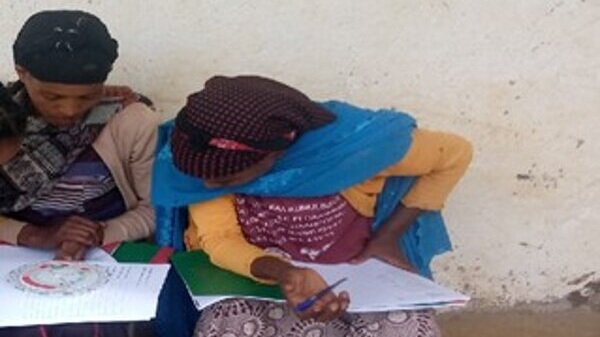Women and Children First has been able to extend our antenatal, postnatal and immunisation calendar pilot project, known as Re-cal-l, in the Goro Woreda of Ethiopia into 2022. This is thanks to the support of our donors and partners.
Every 4 minutes somewhere in the world a pregnant woman dies from preventable, treatable complications.
Attendance at antenatal care, delivery with a skilled birth attendant, attendance at postnatal care, and uptake of a newborn baby’s immunisations could save over 2.6 millions lives every year.
In rural Ethiopia, only 17% of women are able to attend antenatal care in the first trimester, a crucial stage in the baby’s development and to identify risks for the mother.
Women and Children First is providing pregnant women with personalised calendars – reminding them of the dates of their antenatal care and other health appointments.
These are tailored to the local Julian calendar, which consists of 13 months and where the year is 2014.
Local health workers have been trained with our partner, Doctors with Africa CUAMM, to identify pregnant women in their area and visit them to tailor personalised wall calendars.
Based on the date of the pregnant woman’s last period, they use a ‘contact calculator’, turning it to identify the dates they will have for their antenatal contacts, their expected due date and when they should receive their postnatal contacts and vaccinations.
These are then marked on the calendar, which is hung in the woman’s home, reminding them of when to attend important appointments.
The pilot initiative was due to end this year, but thanks to our supporters, and through re-budgeting and reallocating our resources, we have been able to extend the project through to April 2022.
The contact calculators and wall calendars have now been printed, and health workers have been trained on how to use them.
They have been distributed to local health posts, where they are given to pregnant women by the community health workers (also known as the Health Development Army, or HDAs).
So far, over 130 women have received their calendars, prompting them to attend their antenatal care appointments. The aim is for over 1,000 to receive the calendar in over a year.
Pregnant women are already saying that they are happy to receive the calendars and they are finding them useful and helpful.
There are challenges to getting more calendars to the women that need them. July to September brings heavy rain, meaning some villages and households become inaccessible to health workers. It is also a time when people are busy intensely harvesting crops. These reasons make it even more important for women to have the reminders from the calendars.
It is expected that more pregnant women will be able to join the scheme over the next few months. Once women initially have the calendar and the appointments explained to them future meetings with the health workers will be less time intensive, enabling the health workers to reach more women.
Meanwhile Women and Children First is continually working with our partner to track the data and will interview women using the calendar, demonstrating the impact and benefit of the antenatal calendars scheme.
This will help determine whether the initiative is suitable for further testing and rolling out to more mothers across Ethiopia, and in other poor, rural communities across the world.
Women and Children First will provide further project updates as the roll-out of calendars continues in the coming months.



